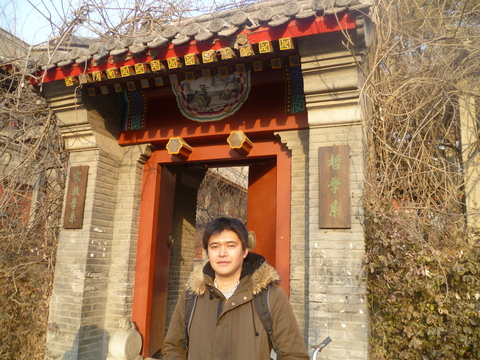Campus Asia Student Workshop in Seoul & Beijing
Workshop Report
I joined the Campus Asia Student Workshop expecting to exchange ideas about the numerous contentious issues in East Asia such as “security in the Korean Peninsula”, “energy, natural resources and environment” and “advancement of China and the changing balance of power in the Asia Pacific region” with colleagues in China and South Korea.
Even though GraSPP has many international students, including those from China and South Korea, making the actual visit to Beijing and Seoul was a very fruitful experience that deepened my understanding of students in both countries by allowing me to experience their study environment, and to gain a new future-oriented approach to the problem solving in East Asia.

Graduate School of International Studies, Seoul National University (GSIS SNU)
GSIS started in 2003 as a result of several reformations after the establishment of the Center for Area Studies in 1989. As it participated in OECD/DAC and the UNDP Seoul policy center has been opened, South Korea plays an important role in supporting developing countries. GSIS, in cooperation with Korea International Cooperation Agency (KOICA), has been promoting its development assistance academically, and widely accepts international students, in particular, students from developing countries from Asia and Africa.
Most classes offered by GSIS, which has several concentrations such as international cooperation, area studies and international business, are taught in English. Aiming to produce “global human resources,” GSIS places importance on the study of foreign languages and offers an ideal environment for ambitious students. GSIS also hosts students with diverse backgrounds including science and engineering, as well as students with other various professional experiences.
Meanwhile, as symbolized in the advancement of Korean's IT industry into the global market, Koreans' preference for studying and working abroad is fundamental, and many Korean students choose studying abroad as an important step for their future careers. GSIS is making further efforts to enhance its international competitiveness with an attractive curriculum. In particular, the role of Campus Asia program will be very important for their global strategy and will be a great opportunity for students who seek professional or academic careers in strengthening cooperation in East Asia.
The School of International Studies (SIS) of Peking University
SIS was established in 1996, combining the Department of International Politics, the Institute of International Relations and the Institute of Afro Asian Studies. Most students, both from all over China and abroad, live in dormitories on campus, studying very hard from the morning until night.
During our visit to SIS, we had a meeting with Prof. Zha Daojing to discuss energy security issues in China and Japan. Prof. Zha, who used to teach at a Japanese university, kindly answered all our questions, sometimes in Japanese.
The earthquake and nuclear power plant accident in Japan was a big shock to researchers and government officers in China, in particular to those who are in charge of promoting its energy policy. Following Japan's nuclear administration reform after the disaster, Prof. Zha, as a member of China's nuclear security committee, led the discussion in China about separating the organization for nuclear security from the organization that promotes nuclear energy policy.
It was quite impressive that the Professor evaluated the current Chinese economic growth as just a figurative aspect of China today. Comparing the current Chinese society with that of Japan in the 1970's, Prof. Zha stressed the importance of mutual cooperation between China and Japan, which are in the same boat in regard to the numerous regional challenges they both face.
Campus Asia Program for the future of East Asia
The Campus Asia program of the University of Tokyo, Peking University, and Seoul National University, will fully start this autumn and will have the important mission of creating the future of three countries in East Asia. As Hilary Clinton points out in her article contributed to Foreign Policy Magazine, the 21st century will be the era of Asia-Pacific and the future direction of the world will be decided in this area; the working closely of these three countries to tackle global issues will thus be inevitable.
In this sense, the Campus Asia program will be an ideal and meaningful opportunity for students who seek professional and academic careers in the future of East Asia to meet new friends and to gain priceless experiences in such a dynamic study environment in Beijing and Seoul.
CAMPUS Asia Student Workshop in Seoul & Beijingに参加して
朝鮮半島の安全保障情勢、資源エネルギーと環境、中国の台頭とアジア太平洋地域のパワーバランスの変化等の東アジアにおける諸問題について、ソウル大学、北京大学の学生と共に未来志向の議論をしたいと考え、Campus Asia Student Workshopに参加した。GraSPPにも中国や韓国からの多くの留学生が在籍しているが、実際に現地を訪問することにより、両国の学生たちが、どのような環境で、いかなる問題意識をもって学んでいるのかを肌で感じ、これからの東アジアを考える上での新しい視座を得られた。
ソウル大学校国際大学院 (GSIS SNU)
ソウル大学校国際大学院(GSIS SNU)は、前身のthe Center for Area Studiesが発足した1989年以降、発展的改組を経て2003年に創設された。近年、韓国はOECD(経済開発協力機構)開発援助委員会(DAC)に加盟し、さらにUNDPソウル政策センターを誘致するなど、途上国支援に積極的に取り組んでおり、GSISのプログラムも韓国国際協力団(KOICA)との協定に基づき、アジアやアフリカなどからの途上国出身の学生を幅広く受け入れている。
GSISでは国際協力、地域研究、国際ビジネス等の各専攻のほとんどの講義が英語で行われ、さらに第二外国語の教育も充実しており、「グローバル人材」育成を念頭に置いた実践的なカリキュラムが組まれている。同大学院の学生の多くは複数の外国語に精通し、理工系や社会人出身の学生も多数在籍するなど、様々なバックグランドをもつ学生の個性が融合した多様性に富んだ環境で学んでいる。
一方で、海外進出の目覚ましい韓国企業に象徴されるように、韓国社会における根強い海外志向を背景として、多くの韓国人学生が海外大学院への留学を希望する中、GSISもカリキュラムの独自性を高め、国際的な競争力を強化するために様々な取り組みを展開している。とりわけ、日中韓の学生・研究者交流をより一層推進するための足がかりとなるCampus Asiaプログラムの果たす役割は大きく、将来、東アジアにおける連携強化に向けて主体的に携わる実務家・研究者を目指す学生にとって、この上ない機会になるであろう。
北京大学国際関係学院 (SIS)
北京大学国際大学院(SIS)は、国際政治学科、国際関係研究所、アジア・アフリカ研究所の統合により1996年に創設された。中国全土はもとより世界各国から集まる学生はキャンパス内部の学生寮に住み、互いに切磋琢磨しながら勉学に励んでいる。
SISでは、Zha Daojiong 教授とエネルギー安全保障に関して議論する機会に恵まれた。同教授は、以前日本の大学で教鞭をとられていたこともあり、時折日本語も交えながら、和やかな雰囲気の中、学生からの様々な質問に丁寧にこたえてくださった。
急成長を続ける中国経済を下支えするエネルギーの需要が増大し、原子力エネルギーへの依存が拡大する中で発生した東日本大震災及び原発事故は、中国のエネルギー政策担当者、研究者に大きな衝撃を与えた。Zha教授は中国政府の原子力安全政策委員会のメンバーでもあり、日本と同様に、従来、原子力の推進と安全規制を同一機関が担っていた行政体制を見直す改革を主導されたそうである。また、GDP規模で日本を抜いて世界2位の経済大国となった中国経済の現状を、実質的には日本の1970年代頃の水準に近いと評し、統計上の数値で成長を語ることに違和感を表明されるとともに、様々な地域的課題を共有する日中両国が連携し、協力し合うことの重要性を強調されたのが印象に残った。
CAMPUS Asiaについて
今年の秋から本格的に始動する東京大学、北京大学、ソウル大学のCampus Asiaプログラムは、日中韓の東アジアの3国の今後の将来を形づくる重要なミッションになるであろう。最近、ヒラリー・クリントン米国務長官がフォーリン・ポリシー誌に寄稿した論文で、「21世紀はアジア太平洋の時代であり、世界の戦略的かつ経済的な重点がアジア太平洋地域に移行しつつある」と指摘したように、地政学的な重要性を増しつつある東アジアの3国がよりいっそう連携を深め、世界をリードして地球規模の課題に組んでいくことが求められている。北京、ソウルで急速に発展する東アジアのダイナミズムを感じながら学ぶ機会はこの上ないチャンスであり、Campus Asiaプログラムを通じて、将来のキャリアを考える上でも重要な出会いや経験を得られるであろう。

